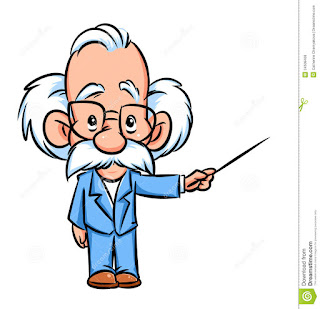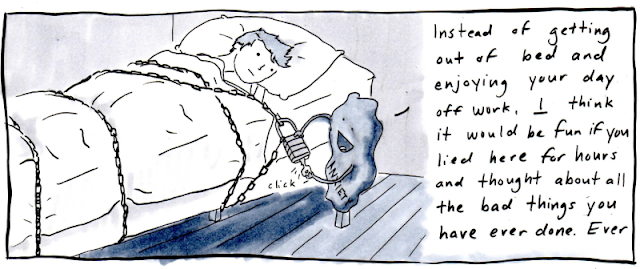Trigger warning: we will be discussing some of the aspects of depression and anxiety that go hand-in-hand with graduate school.
Look, grad school is hard. It's exhausting, poorly-paid, and can often feel futile or endless. For many students fresh from undergrad and used to working on projects that resolve over the course of a term, the endless monotony of large-scale projects is daunting and seemingly impossible. A recent study from Berkeley found that 47% of PhD students suffer or have suffered from depression, and no wonder: with fewer and fewer tenure track jobs, our career track is a long tunnel of over-worked and underpaid TAships and post-docs that will funnel into seemingly nothingness if we can't get our shit together and beat out the competition.
This means we're forced to work even harder in graduate school, publishing more papers and in higher-profile journals which leaves to the inevitable seesawing of "no you have Imposter syndrome" versus "except you're probably not going to get a job if you get rejected by Nature." The end result is that our research is not valuable unless others find it valuable; rejection from journals feels like a cheese-grater on our souls as that career tunnel becomes ever-more narrow. To deal, people often end up working in excess, leading to greater and greater burnout which in turn undercuts your resolve to stay even further.
 |
| Sometimes it seems you just can't keep it together until graduation. |
So. How do you stay at bat when it everything coming at you wants to hit you in the face? We have a few suggestions, gleaned from our own successes at not-dropping-out as well as some literature on personality traits that make people more successful in academia.
Tip#1: REDEFINE YOUR LIFE
If you, like us, find that reading reviews on your papers makes you want to crawl into a hole and die, maybe it's time to remember that your papers are not the sole sum of your worth as a human being. More specifically, science is not who you are, it's what you do. You are a human - a girlfriend, a neighbor, a rock climber, an outdoor enthusiast, an improving cook, good with watercolor pencils, and big fan of Amy Schumer. In other words if you want to not drop out of graduate school, maybe you should stop defining yourself as only a graduate student. |
| Meaghan enjoys birds of prey and zombie movies. She likes rock climbing and witty jokes. |
 |
| Amy enjoys eating jelly beans and reading murder mystery novels. She likes being outside and making collages of adorable animals. |
Tip # 2: GO THE FUCK HOME
 |
| ET is off to increase productivity by not fucking working all the time. |
Pro Tip: If you happen to have an advisor who expects you to work insane hours, try this trick recommended by one of ours: he used to finish his work early, but not send it in to his advisor until late at night. Sneaky, eh? No wonder he got his Ph.D with that sort of devious resourcefulness.
Tip #3: WHERE'S YOUR P?
 |
| HERE IT IS |
Tip #4: SWEAT THE STRESS OUT
It can seem largely impossible to fit yet another thing into your day, but exercise is always worth it. Not only does exercise help you stay physically healthier, but it does wonders for mental health, too. There is nothing like a long run after a particularly frustrating day staring at a computer screen and kickboxing is a great way to work out your anger after that last round of reviews. It may also give you the time away from your project that you need in order to generate some sort of research-revelation!
Tip #5: GO TO THERAPY
Just do it. It's good for you, we promise. Now we know you might be saying, "I have my friends and family to talk to, why do I need a complete stranger?" But guess what, your friends and family are not experts on mental health and their suggestions are not always actually helpful. It's one thing to lean on your friends and family during tough times, we all do that, but it's rude to expect your loved ones to constantly be able to deal with your shit. Professionals on the other hand are literally paid to pay attention to you and they have gone through years of training to deal with the pile of crap you lay out in front of them. Most universities have great mental health resources for students, including discounted rates on therapy. A good therapist can help you see your ticks and help you address them, with the end result that you'll work more effectively and be happier on the whole.
If you aren't ready to jump into the therapy pool just yet, that's okay. Here's a little trick to try in the meantime: name your emotions. Good and bad, putting your emotions into words can make you feel happier overall. Studies have shown that consciously recognizing your emotions can reduce the impacts of those negative feelings. That's right, pretending like your emotions don't exist does not work; it can even have deleterious effects.
Tip # 6: SEE YOUR DOCTOR
Talk to them about problems that may be holding you back: sleep issues, concentration issues, depression, anxiety, etc. Don't be afraid to try medications for these different issues. Another great graduate student and blogger we know just wrote a great post on her changed attitude towards medication that we would like to echo: even if you think it's just stress, it's quite possible your doctor can help.
The Anxiety Monster, by Claire Jones
|
A disability is "a physical or mental impairment that substantially limits one or more major life activities, a person who has a history or record of such an impairment, or a person who is perceived by others as having such an impairment" as copied and pasted from the American Disabilities Act.
That means that if you're suffering from depression, ADHD, bouts of insomnia, carpal tunnel or any other number of problems, you could be considered disabled and your program should make some reasonable accommodations for you. But to get any accommodations, your school needs to know that you suffer from it. At UO, you can register your disabilities with the Accessible Education Center (for school-related things), and at the Affirmative Action Office (for work-related things). If you are suffering from a mental or physical illness, you should register. That way, if you miss class or work because you are having a panic attack at home, for example, it can't be used as grounds for removing you from your program.
Tip #7: REMEMBER ACADEMIA IS A JOB
 |
| This is not your mandatory future! Esp. since he's not even in tweed, amateur. |
Tip # 8: WHAT CAN YOU CHANGE?
Graduate school can feel like an endless hamster wheel of stress and self-doubt, but no matter where you are there are going to be specific things that make that worse and in many cases, they're things you can change. Did you know you can transfer during graduate school? You can. You can change committees, you can change topics, you can change advisors or offices or departments or your work schedule. Do you find lab meetings to be stressful and unproductive? Find reasons to skip them, or use them as a time to reflect on how you would change them. If conferences make you feel like you've accomplished nothing in your life and know nothing, be more selective in the talks that you see, and go to conferences with a buddy in tow. If you can't get work done because your office mate is too chatty or farts too much or is otherwise disruptive, try working in the library or with earphones on. Or feed your office mate fewer beans or something.
IN CONCLUSION
 |
| No. Make it both. |
Find your academic pressure points and release as many of them as you can. Your goal is not to revolutionize your grad experience, just to make it tolerable. Take care of yourself, and don't let yourself be defined by the research you produce - whether it is bad, or even if it is good. Remember that there is a light at the end of this tunnel, and you get to determine where it leads - maybe a tenure track job, but also maybe an awesome industry job, or a fun field-work-focused job with a land management agency. Most importantly, remember that you signed up for graduate school to improve yourself, not destroy yourself. You are the most important part of this equation. Take care of yourself.
Literature
Barkhuizen, Nicolene, Sebastiaan Rothmann, and Fons JR Vijver. "Burnout and work engagement of academics in higher education institutions: Effects of dispositional optimism." Stress and Health 30.4 (2014): 322-332.
http://ga.berkeley.edu/wellbeingreport/
Kinman, Gail. "Pressure points: A review of research on stressors and strains in UK academics." Educational psychology 21.4 (2001): 473-492.
Lieberman, M. D., Eisenberger, N. I., Crockett, M. J., Tom, S. M., Pfeifer, J. H., & Way, B. M. (2007). Putting feelings into words affect labeling disrupts amygdala activity in response to affective stimuli. Psychological science,18(5), 421-428.
Mark, George, and Andrew P. Smith. "Effects of occupational stress, job characteristics, coping, and attributional style on the mental health and job satisfaction of university employees." Anxiety, Stress & Coping 25.1 (2012): 63-78.
http://ga.berkeley.edu/wellbeingreport/
Kinman, Gail. "Pressure points: A review of research on stressors and strains in UK academics." Educational psychology 21.4 (2001): 473-492.
Lieberman, M. D., Eisenberger, N. I., Crockett, M. J., Tom, S. M., Pfeifer, J. H., & Way, B. M. (2007). Putting feelings into words affect labeling disrupts amygdala activity in response to affective stimuli. Psychological science,18(5), 421-428.
Mark, George, and Andrew P. Smith. "Effects of occupational stress, job characteristics, coping, and attributional style on the mental health and job satisfaction of university employees." Anxiety, Stress & Coping 25.1 (2012): 63-78.
Melin, Marika, Wanja
Astvik, and Claudia Bernhard-Oettel. "New work demands in higher
education. A study of the relationship between excessive workload,
coping strategies and subsequent health among academic staff." Quality in Higher Education 20.3 (2014): 290-308.






I am foreseeing more stories from you. Your synthesis and language is, clearly, astonishing and astounding. I need you to appreciate all that life brings to the table for your endeavors. Your blog is fantastically great thank you for share this data this is extremely famous I like it especially there are different things obliged uncommon and quality technique. If you are looking for writing help then feel free to visit site: Cheap essay writing service, you can get better writing help from the professionals...
ReplyDelete